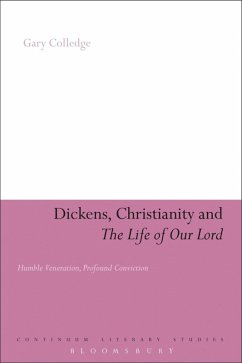While Dickens's religion and religious thought is recognized as a significant component of his work, no study of Dickens's religion has carefully considered his often ignored, yet crucially relevant, The Life of Our Lord.
Written by a biblical studies scholar, this study brings the insights of a theological approach to bear on The Life of Our Lord and on Dickens's other writing. Colledge argues that Dickens intended The Life Of Our Lord as a serious and deliberate expression of his religious thought and his understanding of Christianity based on evidences for his reasons for writing, what he reveals, and the unique genre in which he writes.
Using The Life of Our Lord as a definitive source for our understanding of Dickens's Christian worldview, the book explores Dickens's Christian voice in his fiction, journalism, and letters. As it seeks to situate him in the context of nineteenth-century popular religion-including his interest in Unitarianism-this study presents fresh insight into his churchmanship and reminds us, as Orwell observed, that Dickens "was always preaching a sermon".
Written by a biblical studies scholar, this study brings the insights of a theological approach to bear on The Life of Our Lord and on Dickens's other writing. Colledge argues that Dickens intended The Life Of Our Lord as a serious and deliberate expression of his religious thought and his understanding of Christianity based on evidences for his reasons for writing, what he reveals, and the unique genre in which he writes.
Using The Life of Our Lord as a definitive source for our understanding of Dickens's Christian worldview, the book explores Dickens's Christian voice in his fiction, journalism, and letters. As it seeks to situate him in the context of nineteenth-century popular religion-including his interest in Unitarianism-this study presents fresh insight into his churchmanship and reminds us, as Orwell observed, that Dickens "was always preaching a sermon".


